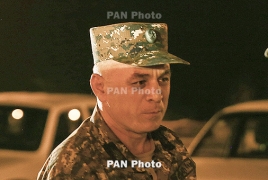Karabakh: If war resumes, we'll repel Azeri forces and advance ourselves April 27, 2016 - 11:29 AMT PanARMENIAN.Net - The military commander of Nagorno Karabakh predicted in an interview Monday, April 25 that a fragile ceasefire could collapse within days, the Washington Post’s David Ignatius says. On the night of April 1-2, Azerbaijani armed forces initiated overt offensive operations in the southern, southeastern and northeastern directions of the line of contact with Karabakh.The Armenian side has suffered 78 combat and 15 non-combat losses, 122 more were wounded. One soldier is still missing. The Azerbaijani side has admitted the loss of 31 fighters, whereas the Armenian side's photo and video materials show dozens of killed Azerbaijani troops.The parties to the Karabakh conflict agreed on a bilateral cessation of fire along the contact line which came into force at midday, April 5. By that night, Azerbaijani shelling had killed two Armenian soldiers in a northern border town. Lt. Gen. Levon Mnatsakanyan, Karabakh’s Defense Minister, said his forces hadn’t expected the broad attack on April 2. But he said there had been warning signs: since August, 21 Armenian soldiers had been killed and 113 wounded in attacks along the line of control. And Azerbaijan had been restocking its arsenal with new Russian tanks, Israeli drones and Turkish missiles. The Armenian side, reassured by a supposed strategic alliance with Russia, didn’t expect a big Azerbaijani offensive. “Tactically, maybe they have registered some successes,” Mnatsakanyan said. “But I would say that considering all the force they used, it’s rather a defeat for them.” Mnatsakanyan insisted that Armenian troops could defend Karabakh, without Russian help: “The result of the four-day war shows that the equipment we have and our combat readiness is okay for stopping any adversaries.” If the war resumes, he says, “we will not only repel them but advance ourselves.” “On the road to the airport, a visitor can see the national monument, a huge stone statue of an old man and woman — heads only, the bodies seemingly buried in the hillside. The official name is “We Are Our Mountains.” The implicit message is: We aren’t moving. What seems ahead is a long, unyielding conflict,” Ignatius concluded. Ignatius visited Karabakh with several other foreign journalists and a member of the European Parliament on a trip organized by the Armenian government. The 90-minute helicopter flight took them over “stunning mountainous terrain to this lush, isolated enclave whose name means “black garden.” During my brief visit, the place seemed a bit like Switzerland in the Caucasus — not just the mountains but also the tidy streets, hillside farms and fiercely independent people.”  The conflict between Nagorno Karabakh and Azerbaijan The conflict between Nagorno Karabakh and Azerbaijan broke out as result of the ethnic cleansing launched by the Azeri authorities in the final years of the Soviet Union. The Karabakh War was fought from 1991 (when the Nagorno Karabakh Republic was proclaimed) to 1994 (when a ceasefire was sealed by Armenia, NKR and Azerbaijan). Most of Nagorno Karabakh and a security zone consisting of 7 regions are now under control of NKR defense army. Armenia and Azerbaijan are holding peace talks mediated by the OSCE Minsk Group up till now. Six total incidents have burned 19 old-growth trees. Friday night 8 trees were torched along the beautiful main entrance. The EU does not intend to conduct military exercises with Armenia, Lead Spokesperson for EU Foreign Affairs and Security Policy Peter Stano says. Hikmet Hajiyev has said that there is no place for USAID operation in Azerbaijan any longer. A telephone conversation between Putin and Pashinyan before the CSTO summit is not planned, Peskov says. Partner news |